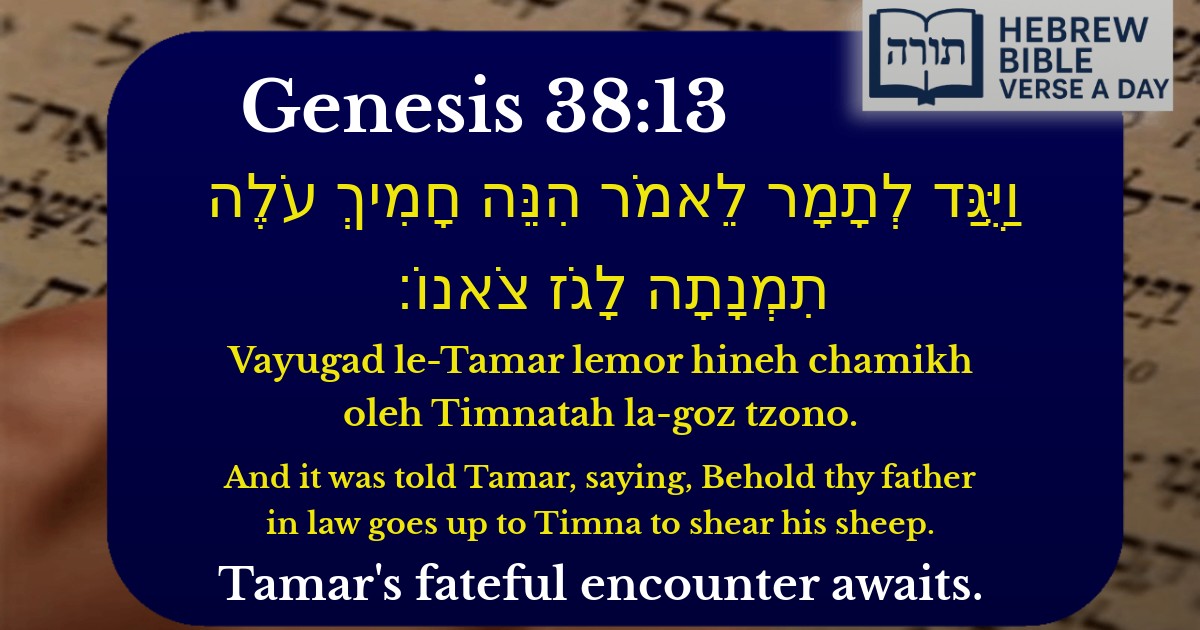Frequently Asked Questions
Q: What is the significance of Judah going to Timna to shear his sheep?
A: According to Rashi, Judah's journey to Timna to shear his sheep was a turning point that led to the story of Tamar. The Midrash (Bereshit Rabbah 85:6) explains that this was part of Divine Providence, setting the stage for the lineage of King David and ultimately the Messiah to come through Tamar's actions.
Q: Why was Tamar informed about Judah's movements?
A: The verse emphasizes that Tamar was actively informed about Judah's journey. The Talmud (Sotah 10b) teaches that this was part of Hashem's plan, as Tamar's righteous intentions to continue the family line led to her pivotal role in Jewish history. She acted out of a sense of duty to preserve Judah's descendants.
Q: What lesson can we learn from this verse about Divine Providence?
A: This verse teaches that seemingly ordinary events (like sheep-shearing) can be directed by Hashem for greater purposes. The Rambam (Hilchos Yesodei HaTorah) explains that Divine Providence guides events, especially for righteous individuals like Tamar, whose actions ensured the continuity of Judah's lineage.
Q: Why does the Torah mention the detail about shearing sheep?
A: Rashi notes that the Torah includes this detail to show Judah's prosperity (as sheep-shearing was a festive time for flocks). The Midrash Tanchuma (Vayeshev 9) connects this to Tamar's wisdom in recognizing the opportunity to fulfill the mitzvah of yibum (levirate marriage), even though Judah had not formally arranged it.
Q: How does this verse connect to Jewish law (halacha)?
A: This verse introduces the background for the laws of yibum (levirate marriage) later formalized in the Torah (Devarim 25:5-10). The Talmud (Yevamot 34a) discusses how Tamar's actions, though unconventional, were motivated by halachic understanding to preserve Judah's family line.


Context of the Verse
The verse (Bereshit 38:13) describes the moment when Tamar is informed that her father-in-law, Yehuda (Judah), is traveling to Timna to shear his sheep. This occurs after Yehuda's two sons, Er and Onan, who were married to Tamar, had died, leaving her a childless widow. According to halacha (Jewish law), Yehuda was obligated to arrange for his third son, Shela, to perform yibbum (levirate marriage) with Tamar, but he delayed doing so.
Rashi's Commentary
Rashi explains that the phrase "וַיֻּגַּד לְתָמָר" ("And it was told Tamar") implies that divine providence orchestrated events to bring Yehuda to Timna. Rashi notes that Yehuda's journey was not merely for shearing sheep but was part of a larger divine plan to ensure the continuation of the lineage leading to the Davidic dynasty and ultimately Mashiach (Bereshit Rabbah 85:7).
Midrashic Interpretation
The Midrash (Bereshit Rabbah 85:8) elaborates that Tamar acted with righteous intent, knowing that she was destined to bear children who would be ancestors of kingship in Israel. Her actions were not driven by personal desire but by a higher spiritual purpose to uphold the continuity of Yehuda's lineage.
Halachic Perspective (Rambam)
Rambam (Hilchos Yibbum 1:1-2) discusses the mitzvah of yibbum and the consequences of neglecting it. Yehuda's initial reluctance to allow Shela to marry Tamar led to Tamar taking matters into her own hands, demonstrating the importance of fulfilling this Torah obligation promptly.
Moral and Ethical Lessons